
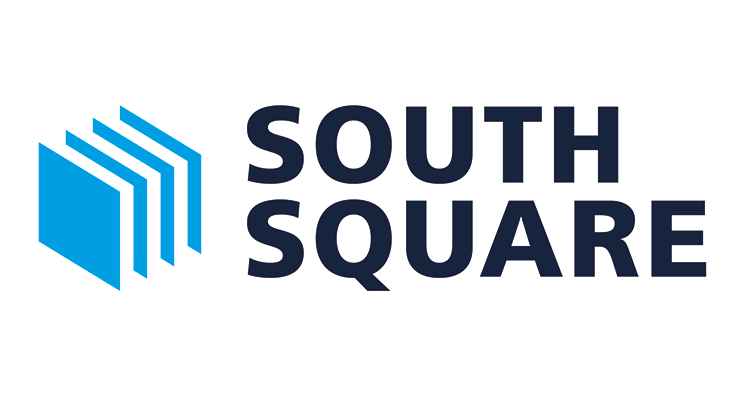
David Alexander QC reports on recent dishonest assistance decisions from England and Gibraltar
As most lawyers know, there are four essential basic ingredients which it is necessary for a claimant to establish to found a claim for dishonest assistance: (1) that there is a trust, (2) that there is a breach of trust by the trustee of that trust, (3) that the defendant induces or assists that breach of trust, and (4) that the defendant does so dishonestly. The first three ingredients often do not cause much trouble: they are either obviously satisfied or they are not. The fourth ingredient, dishonesty, is historically the one which has caused the most trouble. In relation to dishonesty, three things tend to come to mind when one has to consider it.
Firstly there are the big three decisions: the decision of the House of Lords in Royal Brunei Airlines Sdn Bhd v Tan [1995] 2 A.C. 378, the decision of the House of Lords in Twinsectra Ltd v Yardley [2002] UKHL 12; [2002] 2 A.C. 164 and the decision of the Privy Council in Barlow Clowes International Ltd v Eurotrust International Limited [2005] UKPC 37; [2006] 1 WLR 1476.
Secondly, that there are other decisions which have sought to interpret what was said in Tan, Twinsectra and Barlow Clowes: for example, at first instance in Abou-Rahmah v Abacha [2005] EWHC 2662 (QB); [2006] 1 All ER (Comm) 247 and by Arden LJ in the Court of Appeal in the same case [2006] EWCA 1492; [2007] 1 All ER (Comm) 827.
Thirdly, there is the question of whether there have been any recent decisions on dishonest assistance which might have a potential bearing on a claimant’s case. The purpose of this article is simply to draw attention to two decisions this year in relation to financial institutions where the question of dishonest assistance has been considered. In one the financial institution was found not to have been guilty of dishonest assistance. In the other the financial institution was found to have been guilty.
The first decision is that in Singularis Holdings Ltd v Daiwa Capital Markets Europe Ltd [2017] EWHC 257(Ch) where the trial took place before Mrs Justice Rose in November and December 2016. Judgment was given on 16 February 2017. In these proceedings the Claimant was Singularis. It was a company incorporated in the Cayman Islands. It was wholly owned by Maan Al Sanea (“Mr Al Sanea”). By the time the proceedings were brought it was in official liquidation. In the proceedings a claim was made to recover US $204 million. It was alleged that in early June 2009 this sum was held by the Defendant stock broker, Daiwa, for the benefit of Singularis in a segregated account. The US $204 million was made up of two elements. US $124 million was surplus collateral that was left over when Diawa closed down (on 9 June 2009) a long standing secured relationship it had with Singularis. The remaining sum of about US $80 million had arrived into Singularis’ account with Daiwa on 2 June 2009. Over the course of mid-June to mid-July 2009, Daiwa had paid out this money on the instructions of Singularis’ sole shareholder, Mr Al Sanea. The payments were not made to Singularis. Instead they were made to bank accounts in the name of three other companies within the Saad Group. As a result the money had been lost to Singularis.
The liquidators’ claim for recovery of the money from Daiwa was made on two grounds. First it was alleged that the employees of Daiwa who authorised the payments (there were eight payments in total ranging from US $1 million to US $180 million) dishonestly assisted Mr Al Sanea’s breach of fiduciary duty in removing the money from Singularis for the benefit of himself or companies in the Saad Group. Secondly it was alleged that Daiwa was in breach of the duty of care owed by a bank to its client by negligently failing to realise that Mr Al Sanea was committing a fraud on Singularis by misappropriating its monies when he instructed Daiwa to pay the money to third parties: see Lipkin Gorman (a firm) v Karpnale Limited [1989] 1 WLR 1340 and Barclays Bank v Quincecare Ltd [1992] 4 All ER 363.
In so far as concerned the dishonest assistance claim, Mrs Justice Rose held that this claim failed because the two individuals at Daiwa, a Mr Metcalfe and a Mr Hudson, were not dishonest when they approved the disputed payments. In so finding, among other things, Mrs Justice Rose said this:
“143 – The test for dishonesty in this context is that set out by the House of Lords in Twinsectra v Yardley … There Lord Hutton, with whom Lord Slynn of Hadley, Lord Steyn and Lord Hoffmann agreed, described the three possible standards which can be applied to determine whether a person has acted dishonestly. There is a purely subjective standard whereby a person is only regarded as dishonest if he transgresses his own standard of honesty even if that standard is contrary to that of reasonable and honest people; there is the purely objective standard whereby a person acts dishonestly if his conduct is dishonest by ordinary standards of reasonable and honest people, even if he does not realise this, and there is a combined standard:
“…which combines an objective test and a subjective test, and which requires that before there can be a finding of dishonesty it must be established that the defendant’s conduct was dishonest by the ordinary standards of reasonable and honest people and that he himself realised that by those standards his conduct was dishonest”.
144 – His Lordship having considered the test that had been applied by Lord Nicholls of Birkenhead in the earlier case of Royal Brunei Airlines v Tan … confirmed that dishonesty is a necessary ingredient of accessory liability and that (at paragraph 36):
“dishonesty requires knowledge by the defendant that what he was doing would be regarded as dishonest by honest people, although he should not escape a finding of dishonesty because he sets his own standards of honesty and does not regard as dishonest what he knows would offend the normally accepted standards of honest conduct.”
145 – In Barlow Clowes v Eurotrust … Lord Hoffmann considered whether it must be shown that the alleged dishonest assister turned his mind to the ordinary standards of honest behaviour and whether his conduct fell below those standards. He held that it was not necessary. It was only necessary to show that the defendant’s knowledge of the transaction rendered his participation contrary to normally accepted standards of honest conduct. He did not need to be shown to have had reflections about what those normally acceptable standards were.
146 – It is clear that wilful blindness will satisfy the test for dishonesty. An honest person does not “deliberately close his eyes and ears, or deliberately not ask questions, lest he learn something he would rather not know, and then proceed regardless”: Royal Brunei per Lord Nicholls at 389F-G. It is therefore no defence for a defendant to say that he did not realise that he was acting dishonestly: Starglade Properties Ltd v Nash [2010] EWCA Civ 1314 at paragraph 32 and my judgment in Goldtrail Travel Ltd v Aydin & Ors [2014] EWHC 1587 at paragraphs 143-5.
147 – Mr Miles [QC, Leading Counsel for Singularis] accepted that Singularis has to show that a particular person within Daiwa was dishonest. There is an important difference between being incompetent – even grossly incompetent – and being dishonest. The person that Singularis identify as having been dishonest in relation to the payments of $180 million on 18 June 2009 and the payment of $5.2 million on 8 July 2009 is Mr Metcalfe. As regards all the payments except the £180 million payment on 18 June, Singularis also allege that Mr Hudson was dishonest.
148 – As regards Mr Metcalfe, Singularis submits that his conduct went beyond what an honest person would do in the circumstances. They say that in relation in particular to the $180 million payment, no honest person in his position, knowing what he did, would have approved the payment without asking further questions. The same is true of the $5.2 million payment. They say that this is a case where he turned a blind eye. He did not make the enquiries that would be obvious to any honest person because he did not want to know the answer. They point in particular to what Mr Metcalfe told Mr Roberts in his email of 18 June that Mr Weatherall had provided him ‘with necessary documentation that ticked all compliance/legal boxes’. They submit that this was a dishonest statement because he knew that he had not properly explained the situation to anyone in the Compliance or Legal departments or got any formal approval.
149 – As to Mr Hudson, Singularis say that no honest person would have acted in the way he did, making the payments without asking a single question.
150 – I am satisfied on the evidence in this case that neither Mr Metcalfe nor Mr Hudson behaved dishonestly in approving the payments, even in the sense of turning a blind eye to what I regard as the very obvious shortcomings in the material provided to them. Rather they did not understand, despite Mr Wright’s email of 5 June 2009, what they had to do in order for Daiwa to fulfil its obligations to Singularis.
151 – So far as Mr Hudson is concerned, his evidence in the witness box was patently frank and open. Although he had seen Mr Wright’s email, he was never told that something more was expected of him than to carry out the checks that he had always carried out as to whether the recipient was on the list of sanctioned or terrorist organisations. He could not be expected to know the scope of the legal duties incumbent on Daiwa in handling the money…
152 – … There is no basis for finding that he [Mr Hudson] was in any way dishonest in his handling of the approvals and I find that there was no dishonest assistance in relation to the payments which he approved.
153 – The position of Mr Metcalfe is more problematic. Again his evidence in the witness box was given with great clarity and openness and he resisted any temptation to embellish his evidence to excuse his own conduct. He frankly admitted that he should have been more sceptical about the documents Mr Weatherall provided to him to justify the payment of $180 million. But when it was put to him that he deliberately refrained from asking questions because he was turning a blind eye to an obvious fraud, he was emphatic that that was not true.
154 – I have already held that the Hospital Expenses Agreement was a sham document. It was probably created and signed by Mr Al Sanea shortly before it was sent to Mr Metcalfe in response to his request for some evidence of a legal obligation supporting the proposed payment of $180 million. Some of the factors that push me to that conclusion should have been obvious to Mr Metcalfe as well, in particular the fact that this agreement and accompanying invoice was produced like a rabbit from a magician’s hat after the first explanation was rejected. But even on the slightly expanded concept of dishonesty discussed in the authorities, I accept Mr McCaughran QC’s submission on behalf of Daiwa that it is not enough to show that looked at objectively the documents provided to justify the payment were clearly bogus. Singularis have to show that Mr Metcalfe realised that the documents were very odd indeed.
155 – I am satisfied that Mr Metcalfe did not question the authenticity of the documents because he also was not properly instructed as to what he needed to do in response to Mr Wright’s email. For some reason which no one was able to explain he was put in charge of authorising these payments despite being inexperienced in such matters and despite the fact that important considerations expressed by senior management were not passed on to him…
157 – I also take into account three other factors. First, Mr Metcalfe had worked with Mr Weatherall and other people at SFS over a number of years and had formed the view that they were honest and reputable people. He was slow to form suspicions that they would have a hand in a fraud of this kind. I consider he was rather naïve …[b]ut to be naïve is not the same as to be dishonest.
158 – Secondly I accept the point that Daiwa make which is that Mr Metcalfe had no possible motive for acting dishonestly in this situation …
161 – The third factor is that there was at least some attempt by Mr Metcalfe to involve other people in the decision whether to approve the payment or not … It is inconsistent for Mr Metcalfe to involve others in the approval of the payment.”
There are three final matters to record in relation to the Singularis case. First, Mrs Justice Rose did find Daiwa liable to Singularis in negligence and breach of contract for the sum of US $203,741,900. Second Mrs Justice Rose held that such damages should be reduced by 25 percent to take account of Singularis’ contributory negligence. Third, it is understood that the decision is being appealed.
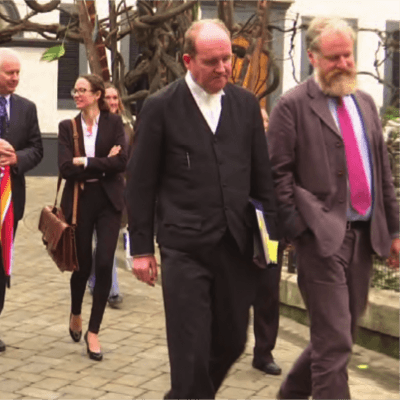
David Alexander QC and Richard Saunders of Moon Beever leaving the Supreme Court in Gibraltar
Turning to the second of the decisions, Edgar Lavarello and Adrian Hyde v Jyske Bank (Gibraltar) Ltd (“Jyske”), a copy of the judgment in the case can be found at http://www.gcs.gov.gi/images/judgme nts/supremecourt/2017/edgar_lavarell o_and_adrian_hyde_v_jyske_bank_gib raltar_ltd.pdf It was a case in the Supreme Court of Gibraltar which arose against the backdrop of the fraud perpetrated by the Marrache brothers against clients of their Gibraltar law firm, Marrache & Co. The fraud led to the firm having a deficiency of £28 million. The Claimants (who were acting on behalf of certain clients of the Firm and/or as trustees for those clients) brought proceedings against Jyske, who had operated office and client accounts on behalf of the Firm, for dishonest assistance and knowing receipt. Jyske denied the claim in its entirety and the trial took place in February 2017.
Judgment was given by Jack J on 16 May 2017. In giving that judgment, Jack J said that the key issue in the case was whether Jyske were dishonest or not. He then said that the law on what constituted dishonesty was conveniently set out by Rose J in Singularis, quoting paragraphs 143-146 of it (i.e. as quoted above). The Judge then identified the only person at Jyske whom it was alleged by the claimants had been dishonest, namely Mr William Bishop. Mr Bishop was the account manager at Jyske charged with responsibility for the Marrache accounts between 2003 and 2010. Having then referred to other matters, the Judge turned to Mr Bishop’s knowledge and found that “the claimants had established at least blind-eye knowledge on the part of Mr Bishop”. He then continued as follows:
“237 – I have considered whether I can go further and find that Mr Bishop was in fact aware of the monies being stolen. I have looked again at the authorities cited in Re Wardour Trading Ltd on burden and standard of proof. I am forced to the conclusion that he was aware monies were being stolen and that he knowingly assisted the Firm in its misappropriation of client monies. Many of the specific allegations against him, which I have outlined in detail above, were so egregious that in my judgment he simply must have been aware that client monies had gone missing, stolen by the Marrache brothers.”
The Judge then listed various matters which in his judgment were sufficiently egregious to show dishonesty and said as follows:
“245 – … I conclude that Mr Bishop did knowingly and dishonestly assist the Marraches brothers to steal client funds. He was aware from at the latest mid-2004 that they had misappropriated client funds. His dishonest assistance continued until the Firm went under in 2010. Jyske are liable for his behaviour.
246 – The earliest losses sustained by clients represented by the claimants in the current action were those of Timeloft Ltd (now represented by Dr Serrero) in mid2005. The losses therefore all post-date Mr Bishop’s involvement in the Marrache fraud. Jyske are therefore (subject to an account and a point of limitation) liable to all of them for dishonest assistance”.
Two final matters to record in relation to the Jyske case. First the Judge also found Jyske liable for knowing receipt. Second it is understood that Jyske propose to appeal Jack J’s decision.
Adam Goodison acted for Daiwa in Singularis Holdings Ltd. David Alexander QC acted for the claimants in Edgar Lavarello and Adrian Hyde v Jyske Bank (Gibraltar) Ltd.
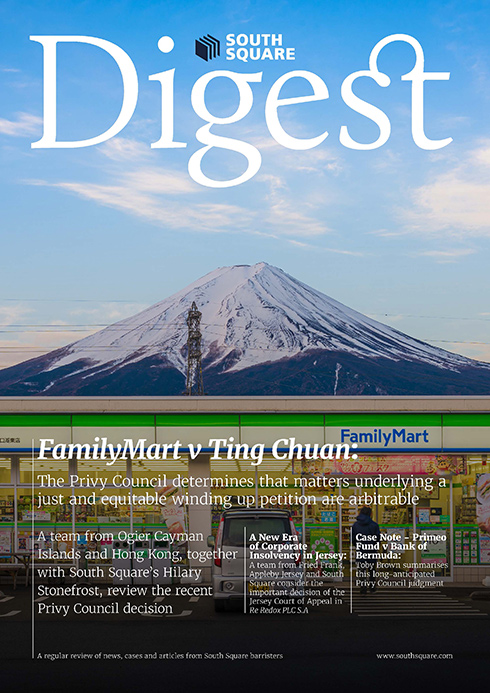

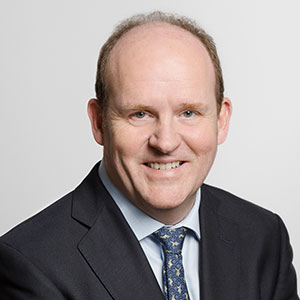
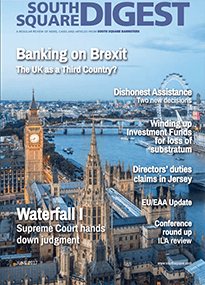



![Brake & Anor v The Chedington Court Estate Ltd [2023] UKSC 29](https://southsquare.com/wp-content/uploads/2024/02/Brake-Anor-scaled-e1728649908896.jpeg)








![New Judgment: Re Argentex LLP [2025] EWHC 3125 (Ch)](https://southsquare.com/wp-content/uploads/2025/06/alejandro-pohlenz-gYbOFTwcJx4-unsplash-scaled.jpg)
